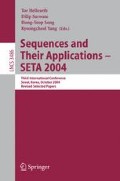Abstract
In order to reduce key sizes and bandwidth, cryptographic systems have been proposed using minimal polynomials to represent finite field elements. These systems are essentially equivalent to systems based on characteristic sequences generated by a linear feedback shift register (LFSR). We propose a general class of LFSR-based key agreement and signature schemes based on n-th order characteristic sequences. These schemes have the advantage that they do not require as much bandwidth as their counterparts based on finite fields. In particular, we present a signature scheme based on a new computational problem, the Trace Discrete Logarithm Problem (Trace-DLP). The Trace-DLP and its variants are discussed and their relationship with well-known finite field-based computational problems is examined. In addition, we prove the equivalence between several LFSR-based computational problems and their finite field-based counterparts.
Access this chapter
Tax calculation will be finalised at checkout
Purchases are for personal use only
Preview
Unable to display preview. Download preview PDF.
References
Diffie, W., Hellman, M.E.: New Directions in Cryptography. IEEE Trans. IT-22, 644–654 (1976)
Fiduccia, C.M.: An Efficient Formula for Linear Recurrences. SIAM J. Comput. 14, 106–112 (1985)
Giuliani, K., Gong, G.: Analogues to the Gong-Harn and XTR Cryptosystems. Combinatorics and Optimization Research Report CORR 2003-34, University of Waterloo (2003)
Giuliani, K., Gong, G.: Efficient Key Agreement and Signature Schemes Using Compact Representations in GF(p 10). In: Proceedings of the 2004 IEEE International Symposium on Information Theory - ISIT 2004, Chicago, pp. 13–13 (2004)
Golomb, S.W.: Shift Register Sequences. Holden-Day, San Francisco (1967)
Gong, G., Harn, L.: Public-Key Cryptosystems Based on Cubic Finite Field Extensions. IEEE Trans. IT-24, 2601–2605 (1999)
Lenstra, A., Verheul, E.: The XTR public key system. In: Bellare, M. (ed.) CRYPTO 2000. LNCS, vol. 1880, pp. 1–19. Springer, Heidelberg (2000)
Lidl, N., Niederreiter, H.: Finite Fields. Addison-Wesley, Reading (1983)
Müller, W.B., Nöbauer, R.: Cryptanalysis of the dickson-scheme. In: Pichler, F. (ed.) EUROCRYPT 1985. LNCS, vol. 219, pp. 50–61. Springer, Heidelberg (1986)
Niederreiter, H.: A public-key cryptosystem based on shift register sequences. In: Pichler, F. (ed.) EUROCRYPT 1985. LNCS, vol. 219, pp. 35–39. Springer, Heidelberg (1986)
Niederreiter, H.: Some New Cryptosystems Based on Feedback Shift Register Sequences. Math. J. Okayama Univ. 30, 121–149 (1988)
Niederreiter, H.: Finite Fields and Cryptology. In: Finite Fields, Coding Theory, and Advances in Communications and Computing, pp. 359–373. M. Dekker, New York (1993)
National Institute of Standards (NIST): Digital Signature Standard. U. S. Government Standard. FIPS-186 (1994)
Quoos, L., Mjølsnes, S.F.: Public Key Systems Based on Finite Field Extensions of Degree Five. Presented at Fq7 conference (2003)
Rabin, M.: Probabilistic Algorithms in Finite Fields. SIAM J. Comput. 9, 273–280 (1980)
Smith, P., Skinner, C.: A Public-Key Cryptosystem and a Digital Signature System Based on the Lucas Function Analogue to Discrete Logarithms. In: Safavi-Naini, R., Pieprzyk, J.P. (eds.) ASIACRYPT 1994. LNCS, vol. 917, pp. 357–364. Springer, Heidelberg (1995)
Tan, C.-H., Yi, X., Siew, C.-K.: On the n-th Order Shift Register Based Discrete Alogarithm. IEICE Trans. Fundamentals E86-A, 1213–1216 (2003)
van Oorschot, P.C., Vanstone, S.A.: A Geometric Approach to Root Finding in GF(q m). IEEE Trans. IT-35, 444–453 (1989)
Author information
Authors and Affiliations
Editor information
Editors and Affiliations
Rights and permissions
Copyright information
© 2005 Springer-Verlag Berlin Heidelberg
About this paper
Cite this paper
Giuliani, K.J., Gong, G. (2005). New LFSR-Based Cryptosystems and the Trace Discrete Log Problem (Trace-DLP). In: Helleseth, T., Sarwate, D., Song, HY., Yang, K. (eds) Sequences and Their Applications - SETA 2004. SETA 2004. Lecture Notes in Computer Science, vol 3486. Springer, Berlin, Heidelberg. https://doi.org/10.1007/11423461_22
Download citation
DOI: https://doi.org/10.1007/11423461_22
Publisher Name: Springer, Berlin, Heidelberg
Print ISBN: 978-3-540-26084-4
Online ISBN: 978-3-540-32048-7
eBook Packages: Computer ScienceComputer Science (R0)

